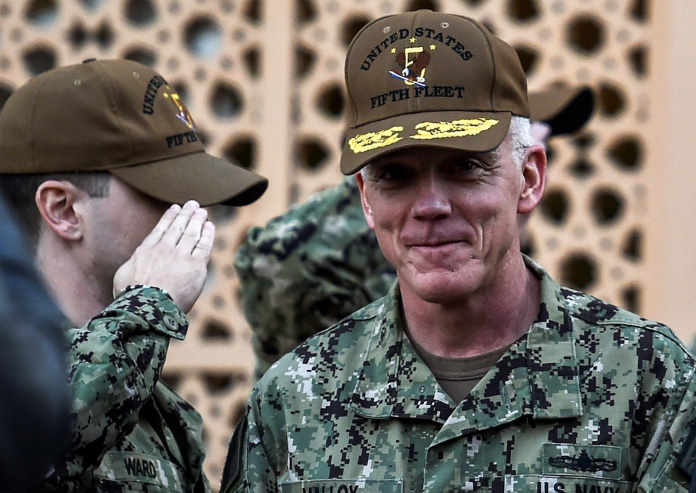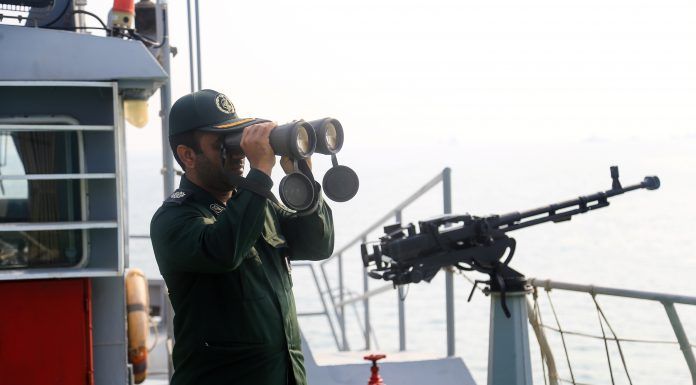
By Phil Stewart
WASHINGTON, Oct 4 (Reuters) – Iran has not drawn back to a less threatening military posture in the region following the Sept. 14 attack on Saudi Arabia, the top U.S. admiral in the Middle East told Reuters, suggesting persistent concern despite a lull in violence.
“I don’t believe that they’re drawing back at all,” Vice Admiral Jim Malloy, commander of the U.S. Navy’s Bahrain-based Fifth Fleet, said in an interview.
The United States, Saudi Arabia, Britain, France and Germany have publicly blamed the attack on Iran, which denies involvement in the strike on the world’s biggest crude oil-processing facility. The Iran-aligned Houthi militant group in Yemen has claimed responsibility.
Malloy did not comment on any U.S. intelligence guiding his assessment. But he acknowledged that he monitored Iranian activities closely, when asked if he had seen any concerning movements of Iranian missiles in recent weeks.
Malloy said he regularly tracks Iranian cruise and ballistic missile movements — “whether they’re moving to storage, away from storage.” He also monitors whether Iran‘s minelaying capabilities head to distribution sites or away from them.
“I get a briefing of movements on a daily basis and then assessments as to what that could mean,” he said.
Relations between the United States and Iran have deteriorated sharply since President Donald Trump pulled out of the Iran nuclear accord last year and reimposed sanctions on its oil exports.
For months, Iranian officials issued veiled threats, saying that if Tehran were blocked from exporting oil, other countries would not be able to do so either.
However, Iran has denied any role in a series of attacks that have followed, including against tankers in the Persian Gulf using limpet mines earlier this year.
“DENY IT IF YOU CAN”
Asked what the latest attack in Saudi Arabia showed him, Malloy said: “From my perspective, it is a land-based version of what they did with the mines … quick, clandestine — deny it if you can.”
“Send a signal and harass and provoke,” he said.
His remarks came a week after the Pentagon announced it was sending four radar systems, a battery of Patriot missiles and about 200 support personnel to bolster Saudi defenses — the latest in a series of U.S. deployments to the region this year amid escalating tensions.
Still, the latest deployment was more limited than had been initially under consideration.
Reuters has previously reported, for example, that the Pentagon eyed keeping an aircraft carrier in the Persian Gulf region indefinitely, amid speculation that the USS Abraham Lincoln carrier strike group will soon need to wind up its deployment.
Malloy declined to speculate about future carrier deployments. But he acknowledged the tremendous value of aircraft carriers — as well as the ships in the strike groups that accompany an aircraft carrier.
That includes the contribution of destroyers now accompanying the USS Abraham Lincoln to a U.S.-led, multinational maritime effort known as Operation Sentinel.
It is meant to deter Iranian attacks at sea — and expose them if they occur.
SHINING A FLASHLIGHT
“What Sentinel seeks to do is shine a flashlight across that and make sure that if anything happens in the maritime, they will be exposed for that activity,” he said.
This includes by providing a surveillance and communication backbone to share intelligence with nations that have agreed to participate, which include Britain, Australia, Bahrain, Saudi Arabia and the United Arab Emirates.
“We’ve created essentially a zone defense,” he said.
Washington first proposed the effort in the Gulf in June after accusing Iran of attacking oil tankers around the Strait of Hormuz, a critical maritime chokepoint. But the proposal was met with concern in some European capitals, already at odds with Washington over its withdrawal from the nuclear deal.
Malloy met Saudi Arabia’s naval commander on Sunday, assuring him of U.S. support following the Sept. 14th attack, which rattled global oil markets. He said U.S. support included intelligence sharing.
“We are constantly in the process of tightening that information flow with them,” Malloy said.
(Reporting by Phil Stewart; Editing by Sandra Maler)


